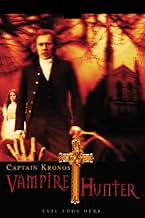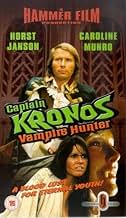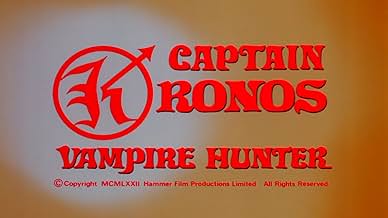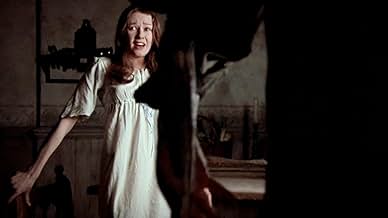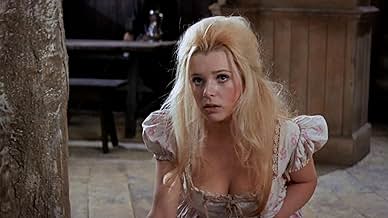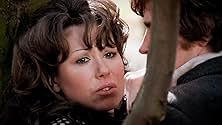IMDb RATING
6.3/10
6.1K
YOUR RATING
A master swordsman and former soldier and his hunchbacked assistant hunt vampires.A master swordsman and former soldier and his hunchbacked assistant hunt vampires.A master swordsman and former soldier and his hunchbacked assistant hunt vampires.
- Director
- Writer
- All cast & crew
- Production, box office & more at IMDbPro
Featured reviews
Proof definite that Hammer could survive without Christopher Lee, Peter Cushing, or even their borrowed Universal monsters (Frankenstein's monster, Dracula, the Mummy). Kronos is an entirely original take on vampires and monster-hunting. Brian Clements (The Avengers) has fun with the concept, and you're never quite sure if you're watching a parody or a homage. Kronos works either way, though. Check out the swordfight scene that's a parody of every Western ever, when Kronos kills three men before they (or us) can see him draw his sword. Lots of action, and an interesting vampire concept, make for a must-see movie.
Was Horst Janson really forty years old when he made this? Damn, the man looked good!
Horst plays Captain Kronos, a man who wears a snappy uniform and hunts youth-draining vampires in the company of an affable hunchback. He also wears a bag on his head as part of some bizarre meditative ritual. Aside from the bag-wearing part, he's a solid action hero, and it's a shame that Hammer never turned this good little movie into one of its long-running franchises.
The acting is a highlight: John "don't call me Johnny" Carson gives one of his typically likable and neurotic performances as Doctor Marcus, Wanda Ventham makes a lovely villainess, and Ian Hendry has an amusing cameo as an obnoxious thug (how the mighty had fallen, though -wasn't he a star at one point?). There's also great lines aplenty and some nice choreography for the sword-fights.
This is the kind of movie that Full Moon - or for that matter, Dimension films - wishes it could make. Alas, modern horror is usually too gross and uninventive to match the charm and creativity of a Hammer "classic" such as "Captain Kronos."
Horst plays Captain Kronos, a man who wears a snappy uniform and hunts youth-draining vampires in the company of an affable hunchback. He also wears a bag on his head as part of some bizarre meditative ritual. Aside from the bag-wearing part, he's a solid action hero, and it's a shame that Hammer never turned this good little movie into one of its long-running franchises.
The acting is a highlight: John "don't call me Johnny" Carson gives one of his typically likable and neurotic performances as Doctor Marcus, Wanda Ventham makes a lovely villainess, and Ian Hendry has an amusing cameo as an obnoxious thug (how the mighty had fallen, though -wasn't he a star at one point?). There's also great lines aplenty and some nice choreography for the sword-fights.
This is the kind of movie that Full Moon - or for that matter, Dimension films - wishes it could make. Alas, modern horror is usually too gross and uninventive to match the charm and creativity of a Hammer "classic" such as "Captain Kronos."
Hammer was trying to change their failing and falling image in the 1970s and directed their cinematic resources towards other non-traditional horror themes. They came out with the Karnstein Trilogy of vampire films with lesbian overtones. They had Darcula meet kung fu in The Legend of the Seven Golden Vampires. Hammer showed more and more cleavage(and in many instances dispensed with the clothes altogether). They had Dr. Jekyll have a sister Hyde. And in 1973, Hammer tried to start a swashbuckling super hero vampire hunter with the film Captain Kronos, Vampire Hunter. The concept was that Kronos recently of fighting in the war, having lost his sister and mother to vampirism, set off into various European locales with his friend/hunchback/professor in search of evil to stamp out. The movie is at some points obvious parody and at others a homage of sorts to earlier Hammer pieces. The film is quite enjoyable for what it is. It does have many flaws, however, most dealing with a total lack of respect for traditional vampire lore. Day and night seem not to matter to the vampire, nor does the vampire drink for thirst but rather for eternal beauty. Okay. Credit certainly is due to the innovative and creative Brian Clemens who wrote and directed the film. The acting is acceptable. Horst Janson is okay as Kronos but really has little personal flair. Most of the film has him with his shirt off(pity more like this was not directed toward co-star Caroline Munro). Munro is okay in her role too. Really most of the acting is pretty bland with a couple good performances given by John Cater as the professor and John Carson as Dr. Marcus. The highlight of the film easily is the tavern scene when Kronos meets up with a trio of thugs led by Ian Hendry. Hendry has fun with his cameo. All in all Captain Kronos is an exciting and interesting picture to see. The sets and costumes are up to the usual high Hammer standards. The musical score is wonderful as well.
Among the least known of the Hammer Studios horror output, Captain Kronos: Vampire Hunter is also one of its most interesting and unusual productions. As opposed to the more in-your-face Dracula series that immortalized Christopher Lee, CK:VH knows that it is just a cinematic comic book and works with itself in a restrained, somewhat lighthearted way that is, off and on, quite effective. This film never really tries to outright scare you which, I think, is extremely cool. Instead, it sets an atmospheric table at which your imagination is invited to partake. This suave slant is the work of Director Brian Clemens who was largely responsible for the legendary '60's British TV series, The Avengers; the original, with Patrick Macnee and Diana Rigg. If you remember that series, you'll recognize some of its essential look and feel in this film. Viewed from one azimuth, CK:VH is nonsense but, if you lighten up a bit and just get into the story, the movie takes on a dreamy quality against which its more `horrific' elements play in a most interesting way.
The setting, never precisely defined, seems to be central Europe during or just after the Napoleonic Wars (from the clothes). Let's call it early 19th century. Captain Kronos himself appears to be a former officer of Dragoons, separated from service although still in uniform. The implication is that, while away in the wars, he lost his wife, and possibly his child, to vampires. Now, in the company of his good friend, a hunchbacked academic and authority on vampire lore who drives a wagon loaded with tools of the vampire-killing trade, the Captain roams the region hunting the undead.
Captain Kronos is played by the German actor Horst Janson who, with his grave, nearly too-nordic features, balanced by eyes that seem to constantly smile, brings a nice sense of mystery to the role. Kronos is aloof and taciturn, though never unpleasant. He smokes long cheroots and carries a Samurai sword that he, evidently, did not acquire at a flea market. We don't learn the history of the sword, but we see that he can definitely wield it, as does a trio of toughs fronted by the local alpha-blade (the late Ian Hendry, a prominent British character actor of the period who, interestingly, was a regular during the Avengers' first season.) Actually, they don't really see the sword. They just feel it, sort of, before collapsing in a heap. Janson plays the Captain with a certain Playboy Magazine, lady's man sense of cool, echoing a time when people were just finishing up talking about sex and beginning to actually do it. If you were around then, you'll recognize the spin. It's a nostalgia hit, for sure. You might even recognize Janson's face, which was seen in full page ads in American magazines during that period; men's apparel, liquor, etc.
The Captain and his trusty companion have arrived in the film's locale in response to rumors of bad happenings. Young women of the area are undergoing drastic reverse-makeovers, emerging from them as exsanguinated centenarians. The locals, rather superstitious rural types, are in a tizzy. Could the recently-deceased head of the local, reclusive aristocratic family, whom some suspect of not being completely dead, be involved? It's an angle definitely worth investigating. The Captain makes contact with the only person in the area still in possession of his wits - the local physician - and the hunt begins.
If most Hammer films tend to be hissing fastballs down the middle, CK:VH is an off-speed slider on the corner. There's nothing fancy here, no baroque sets or sophisticated effects. In fact, the film overall has a sparse look and feel that enhances its credibility. The hunt for the vampire proceeds as a believable combination of scientific method and lore. Much of what transpires does so in daylight which, to me, carries significant implications. Evil that does not fear sunlight carries a big stick. We, as its prey, have no real hiding place. The film balances its occasionally goofy moments by never sacrificing its dignity and, at times, is quite poignant. It also features one of the most brilliantly effective sequences ever seen in this genre, illustrating how much can be accomplished with the simplest of cinematic means. I think you'll know it when you see it. This film was produced as the first in what was hoped to be a series of Captain Kronos adventures but the concept failed to grab the required audience. Pity, but at least we have this one. It's fun, stylish, and a perfect rainy-day diversion.
The setting, never precisely defined, seems to be central Europe during or just after the Napoleonic Wars (from the clothes). Let's call it early 19th century. Captain Kronos himself appears to be a former officer of Dragoons, separated from service although still in uniform. The implication is that, while away in the wars, he lost his wife, and possibly his child, to vampires. Now, in the company of his good friend, a hunchbacked academic and authority on vampire lore who drives a wagon loaded with tools of the vampire-killing trade, the Captain roams the region hunting the undead.
Captain Kronos is played by the German actor Horst Janson who, with his grave, nearly too-nordic features, balanced by eyes that seem to constantly smile, brings a nice sense of mystery to the role. Kronos is aloof and taciturn, though never unpleasant. He smokes long cheroots and carries a Samurai sword that he, evidently, did not acquire at a flea market. We don't learn the history of the sword, but we see that he can definitely wield it, as does a trio of toughs fronted by the local alpha-blade (the late Ian Hendry, a prominent British character actor of the period who, interestingly, was a regular during the Avengers' first season.) Actually, they don't really see the sword. They just feel it, sort of, before collapsing in a heap. Janson plays the Captain with a certain Playboy Magazine, lady's man sense of cool, echoing a time when people were just finishing up talking about sex and beginning to actually do it. If you were around then, you'll recognize the spin. It's a nostalgia hit, for sure. You might even recognize Janson's face, which was seen in full page ads in American magazines during that period; men's apparel, liquor, etc.
The Captain and his trusty companion have arrived in the film's locale in response to rumors of bad happenings. Young women of the area are undergoing drastic reverse-makeovers, emerging from them as exsanguinated centenarians. The locals, rather superstitious rural types, are in a tizzy. Could the recently-deceased head of the local, reclusive aristocratic family, whom some suspect of not being completely dead, be involved? It's an angle definitely worth investigating. The Captain makes contact with the only person in the area still in possession of his wits - the local physician - and the hunt begins.
If most Hammer films tend to be hissing fastballs down the middle, CK:VH is an off-speed slider on the corner. There's nothing fancy here, no baroque sets or sophisticated effects. In fact, the film overall has a sparse look and feel that enhances its credibility. The hunt for the vampire proceeds as a believable combination of scientific method and lore. Much of what transpires does so in daylight which, to me, carries significant implications. Evil that does not fear sunlight carries a big stick. We, as its prey, have no real hiding place. The film balances its occasionally goofy moments by never sacrificing its dignity and, at times, is quite poignant. It also features one of the most brilliantly effective sequences ever seen in this genre, illustrating how much can be accomplished with the simplest of cinematic means. I think you'll know it when you see it. This film was produced as the first in what was hoped to be a series of Captain Kronos adventures but the concept failed to grab the required audience. Pity, but at least we have this one. It's fun, stylish, and a perfect rainy-day diversion.
While few of the Hammer horror films took themselves too seriously it was in the 1970s when the cycle became almost a parody of itself and "Captain Kronos, Vampire Hunter" is perhaps the best example of this. Although it is a little known film it is certainly one of the best horrors, largely due to its original take on the vampire theme and imaginative, albeit risky, casting.
Rather than offer the audience another Christopher Lee dominated vampire flick, "Kronos" features Horst Janson in the title role and he is essentially the Clint Eastwood character from the Sergio Leone Spaghetti Westerns. This means Kronos is unstoppable with a sword and can kill several men with one quick swish of his blade, best displayed when the brilliant Ian Hendry and his mob make the mistake of picking a fight with him.
It is important not to take the film or the cast too seriously as this is essentially a comedy-horror. There are several very amusing scenes such as when Kronos and his hunchbacked helper struggle to find a way to destroy a particularly nasty vampire, making light of the many and varied ways to supposedly kill one of the undead.
Like all Hammer Horror films "Kronos" benefits from having a short 90- minute running time, concentrating more on action and bloodletting than the idle chat that typified Francis Ford Coppola's "Bram Stoker's Dracula". It is also good to see a vampire film in which the hero is dangerous and unpredictable and not entirely wholesome such as the Van Helsing character often is.
Anyone who found "Blade" to be too noisy and over-the-top (karate and vampires do not go together) should watch "Kronos" which is essentially the same film but far more subtle - like the difference between using a scalpel and a chainsaw.
Rather than offer the audience another Christopher Lee dominated vampire flick, "Kronos" features Horst Janson in the title role and he is essentially the Clint Eastwood character from the Sergio Leone Spaghetti Westerns. This means Kronos is unstoppable with a sword and can kill several men with one quick swish of his blade, best displayed when the brilliant Ian Hendry and his mob make the mistake of picking a fight with him.
It is important not to take the film or the cast too seriously as this is essentially a comedy-horror. There are several very amusing scenes such as when Kronos and his hunchbacked helper struggle to find a way to destroy a particularly nasty vampire, making light of the many and varied ways to supposedly kill one of the undead.
Like all Hammer Horror films "Kronos" benefits from having a short 90- minute running time, concentrating more on action and bloodletting than the idle chat that typified Francis Ford Coppola's "Bram Stoker's Dracula". It is also good to see a vampire film in which the hero is dangerous and unpredictable and not entirely wholesome such as the Van Helsing character often is.
Anyone who found "Blade" to be too noisy and over-the-top (karate and vampires do not go together) should watch "Kronos" which is essentially the same film but far more subtle - like the difference between using a scalpel and a chainsaw.
Did you know
- TriviaThis was to have been the first in a series of films. The poor box office cancelled those plans. The poor returns also contributed to the decline in the box office track record of Hammer Films.
- GoofsAt time 1:04:40, as the young girl puts the lamp down on the table, you can briefly see the electrical cord fall to the ground from under her arm, where it was hidden while she walked down the steps.
- ConnectionsFeatured in Rear Window: Dracula: The Undiscovered Country (1993)
- How long is Captain Kronos: Vampire Hunter?Powered by Alexa
Details
Box office
- Budget
- £160,000 (estimated)
- Gross worldwide
- $442
- Runtime
- 1h 31m(91 min)
- Color
- Aspect ratio
- 1.85 : 1
Contribute to this page
Suggest an edit or add missing content


